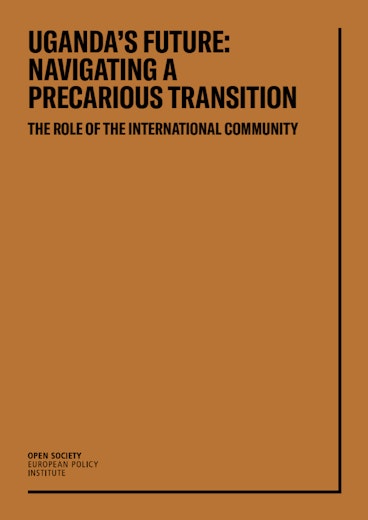Who will succeed Ugandan President Yoweri Museveni, and under what circumstances? Given Museveni’s advanced age—he turns 78 later this year and has been in power for 36 years—this is no longer a purely theoretical debate.
The transition question highlights the increasingly authoritarian nature of Museveni’s regime: political space has been closed off; a largely personalized system of governance has replaced structurally weakened state institutions, and the prospect of democratic election has become increasingly unlikely.
Given these dynamics, Uganda is heading to a major political crisis, with a high potential for violence among groups competing for power—a process which will bring ethnicity further to the foreground.
The donor community, and the European Union in particular, needs to shift from a business-as-usual approach, as it will only further entrench these dangerous features of Uganda’s political system.
The report—and the accompanying policy brief for the EU donor community—describes the current dynamics of the Museveni regime and ways in which a transition could unfold. It examines what an impending transition means for the international community and the EU in particular.
Download
-
Uganda’s Future: Navigating a Precarious Transition (723.6 Kb pdf file)
Download the complete 56-page report.
-
Uganda’s Future: Navigating a Precarious Transition: Policy Brief (333.83 Kb pdf file)
Download the 22-page policy brief.
Read more
Resilience in Moldova
Q&A: Moldova’s Path to a European Future

Moldova has endured the Kremlin’s aggression because it has chosen to leave Russia's sphere of influence and supports Ukraine. The impact of the war on daily life—and why the nation is determined to join the EU.
Rethinking the EU
In an Age of Crisis, an Opportunity to Remake the EU

From climate change to rising authoritarianism, Europe is facing a range of crises that threaten the way we live. The EU must seize the opportunity to reshape how it works and rethink what role it plays in a changing world.
Corporate Responsibility
Q&A: Why (Some) Investors Want More Regulation

As the EU works on rules to protect worker rights and the planet from corporate harm, Open Society’s Jon Jacoby spoke to Anita Dorett, of the Investor Alliance for Human Rights, about how investors are pushing for change.
